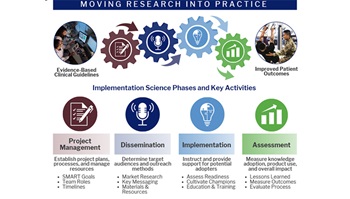New evidence-based practices can improve health care, yet they don’t always get adopted. There are many reasons for this, including a lack of awareness, lack of training and implementation support, and a reluctance to doing things differently than in the past—to name a few. Even mandates to adopt a certain new service or practice may not overcome some of these barriers.
Recently, the Defense Health Agency’s Women’s Health Clinical Management team faced an aggressive three-month deadline to roll out new walk-in contraceptive services at military hospital and clinics across the Military Health System. The new initiative aimed to increase access to contraceptive care for active duty service members and other eligible beneficiaries.
The clinical team called for support from the Implementation Science Branch of the DHA’s Research and Engineering Directorate. ISB helped the team establish peer-to-peer workgroups, develop implementation resources, cultivate champions at each site, and measure compliance. Working together, the clinical and implementation teams achieved 100% compliance across all 130 military hospital and clinics by Jan. 30, 2023.
 The Implementation Science Branch is part of the Defense Health Agency’s Research and Engineering directorate. The program helps Military Health System organizations to move medical research and leading practices into broad-based clinical practice and supports DHA priorities focused on outcomes, readiness, and satisfied patients. (Credit: DHA Research and Engineering Directorate)
The Implementation Science Branch is part of the Defense Health Agency’s Research and Engineering directorate. The program helps Military Health System organizations to move medical research and leading practices into broad-based clinical practice and supports DHA priorities focused on outcomes, readiness, and satisfied patients. (Credit: DHA Research and Engineering Directorate)The monthly compliance reviews and bi-monthly meetings with military hospital and clinic champions enabled quick identification of implementation challenges and site-specific leading practices, which facilitated targeted coaching and the development of plug-and-play resources (such as training and standard operating procedure templates) to address needs and gaps.
“The ISB process helped us rapidly build a comprehensive program that made it easier for hospital and clinic staff to implement walk-in contraceptive services. All the developed resources and collaborative meetings helped ease the burden to comply with requirements and overcome many barriers,” said U.S. Air Force Col. Sheelah Walker, chief of the Women’s Health Clinical Management Team.
ISB provides consultation support to organizations across the DHA on the rollout of new guidelines, policies, and evidence-based practices. This support advances improvements in health care by moving impactful projects toward widespread adoption.
The branch applies a systematic, proven approach by incorporating project management, dissemination, implementation, and assessment leading practices. This process takes a holistic view of projects from initiation through long-term sustainment, building comprehensive plans and coordinating with both military hospitals and clinics and DHA stakeholders to leverage expertise across the MHS.
"Within DHA, we have an opportunity to weave implementation science-leading practices throughout our health system to move toward a more patient-centered future," said Lynn Hallard, acting chief for ISB.
ISB is a multidisciplinary team of experts in the fields of communications, project management, implementation science, evaluation, and facilitation. This diversity enables hand-over-hand coordination with clinical experts to support initiatives from inception through implementation and sustainment.
ISB has worked on a number of initiatives, including the postpartum hemorrhage bundle campaign, colorectal cancer screening awareness, direct access to physical therapy, and trauma research translation.
For more information on the ISB and the Research and Engineering Directorate, visit www.health.mil/Research.